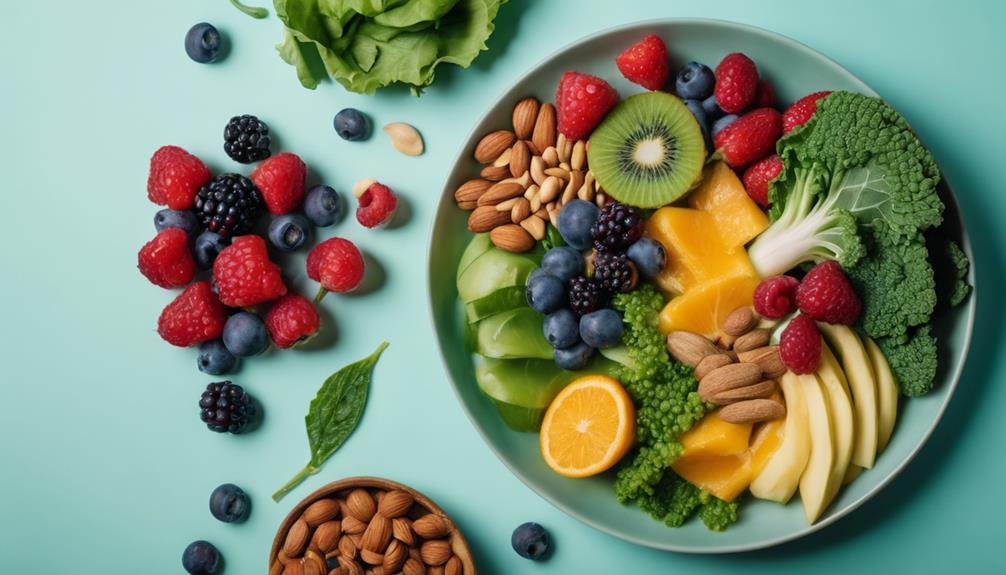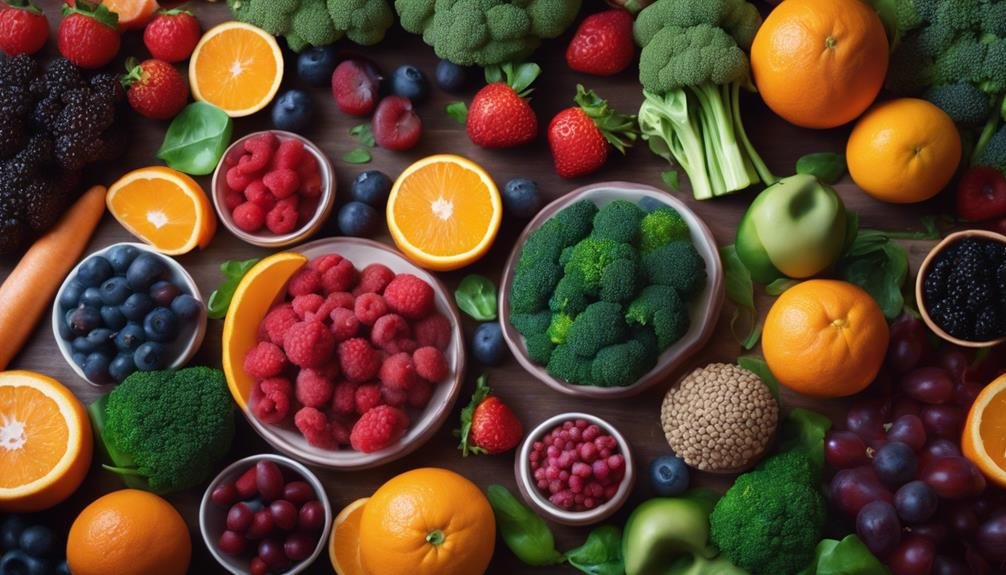"Cherishing Little Steps - A Haven for Baby and Family Journeys"
Boosting Immunity in Toddlers Through Diet: What Works?
Did you know that certain foods can significantly boost your toddler's immunity and protect them from common illnesses? Understanding how diet plays a crucial role in strengthening their immune system is key to ensuring their well-being. By exploring the effectiveness of specific nutrients, superfoods, and hydration in supporting your toddler's immune function, you can make informed choices to enhance their overall health. Discover the secrets to fortifying your toddler's immunity through simple dietary adjustments and providing them with the necessary tools to thrive.
Key Takeaways
- Include nutrient-rich foods like fruits, vegetables, and whole grains in toddlers' diets for essential vitamins and minerals.
- Offer foods rich in vitamin C like berries and citrus fruits to boost immune function in toddlers.
- Ensure toddlers get enough vitamin D, zinc, and iron through a balanced diet to support their immune system.
- Provide immune-boosting superfoods such as yogurt with live cultures and nuts/seeds rich in healthy fats.
- Hydrate toddlers with water and water-rich foods to maintain immune function and overall health.
Benefits of Nutrient-Rich Foods

To support your toddler's immune system, incorporating a variety of nutrient-rich foods into their diet is crucial. Nutrient-dense foods like fruits, vegetables, whole grains, lean proteins, and healthy fats contain essential vitamins, minerals, and antioxidants that play a significant role in strengthening your child's immune response.
For example, colorful fruits such as berries, oranges, and kiwis are packed with vitamin C, a powerful antioxidant that helps boost the immune system by fighting off harmful pathogens. Similarly, foods like spinach, sweet potatoes, and carrots are rich in beta carotene, which the body converts into vitamin A, essential for maintaining healthy immune function.
Key Vitamins and Minerals
Key vitamins and minerals are essential for supporting your toddler's immune system and overall health. Ensuring your little one gets a variety of nutrients is crucial for their development and resilience against illnesses. Vitamin C, found in fruits like oranges and strawberries, helps boost the immune system and aids in wound healing. Vitamin D, obtained from sunlight and fortified foods, is important for bone health and immune function. Zinc, present in foods like meat, seeds, and legumes, plays a role in immune cell development and function. Iron is vital for carrying oxygen in the body and can be sourced from foods like lean meats and beans.
These nutrients work together to keep your toddler healthy and strong. While a balanced diet is the best way to provide these vitamins and minerals, sometimes supplements may be necessary, especially if there are deficiencies. Consulting with a healthcare provider can help determine if your child needs any additional support through supplements. By prioritizing these key vitamins and minerals in your toddler's diet, you're setting them up for a robust immune system and optimal health.
Immune-Boosting Superfoods

For your toddler's optimal health and immune system support, consider incorporating immune-boosting superfoods into their diet. Superfoods like berries, such as blueberries and strawberries, are packed with antioxidants that help fight off infections. Including citrus fruits like oranges and kiwis provides a vitamin C boost, essential for immune function. Dark leafy greens like spinach and kale are rich in vitamins A and C, crucial for immune health.
Additionally, yogurt with live cultures can promote the growth of good bacteria in the gut, supporting a healthy immune system. Nuts and seeds like almonds and sunflower seeds offer a dose of healthy fats and vitamin E, which play a role in immune function.
Don't forget about incorporating sources of lean protein like chicken and beans, which provide zinc—a mineral important for the development and function of immune cells. By including these immune-boosting superfoods in your toddler's diet, you can help strengthen their immune system and support their overall well-being.
Balancing Macronutrients for Immunity
Consider the balance of macronutrients in your toddler's diet to support their immune system and overall health. Ensuring your little one receives the right combination of proteins, carbohydrates, and fats is essential for their growth and defense against illnesses. Here is a breakdown of how each macronutrient can contribute to boosting your toddler's immunity:
| Macronutrient | Role in Immunity |
|---|---|
| Proteins | Aid in building antibodies and enzymes that help fight infections. |
| Carbohydrates | Provide energy for immune cells to function optimally. |
| Fats | Essential for absorbing fat-soluble vitamins crucial for immune health. |
Hydration and Immune Function

Ensuring your toddler stays well-hydrated is crucial for supporting their immune function and overall health. Hydration plays a vital role in maintaining a robust immune system in little ones. Proper fluid intake helps transport essential nutrients, flush out toxins, and maintain optimal body temperature, all of which contribute to a healthy immune response.
For toddlers, water is the best choice to keep them hydrated throughout the day. Encourage your child to drink small amounts frequently, especially during meals and playtime. Offering water-rich foods like fruits and vegetables can also contribute to their daily fluid intake.
Dehydration can weaken the immune system, making your toddler more susceptible to illnesses. Signs of dehydration in toddlers include dry lips, dark urine, and irritability. To prevent dehydration, ensure your child has easy access to water and remind them to take sips regularly.
Frequently Asked Questions
Can Allergies Affect Toddler Immunity?
Allergies can impact toddler immunity by taxing the body's defenses. When dealing with allergies, immune resources may be diverted, potentially weakening overall immunity. It's important to manage allergies to support your toddler's immune system.
Is Organic Food Better for Toddler Immunity?
When it comes to toddler immunity, choosing organic food can be beneficial. Organic options often have fewer pesticides and more nutrients, supporting your little one's immune system. Remember, every bite counts in keeping your child healthy.
How Does Stress Impact Toddler Immune Health?
When toddlers experience stress, their immune system can weaken, making them more susceptible to illnesses. Providing a calm environment, engaging in soothing activities together, and ensuring nutritious meals can help boost your child's immune health.
Are Probiotics Beneficial for Toddler Immunity?
Wondering if probiotics help your toddler's immunity? Evidence suggests they can enhance gut health, potentially aiding the immune system. Consult with a healthcare provider to see if including probiotics in their diet could benefit them.
Can Environmental Factors Weaken Toddler Immunity?
Exposure to pollutants, smoke, and germs can weaken your toddler's immunity. Encourage handwashing, a balanced diet rich in fruits and veggies, and limit exposure to harmful substances. Prioritize a clean and healthy environment for your little one's well-being.
Conclusion
In conclusion, boosting your toddler's immunity through diet is crucial for their health. By incorporating nutrient-rich foods and key vitamins and minerals into their meals, you can support their immune system.
For example, a study conducted with toddlers who consumed a variety of immune-boosting superfoods showed a decrease in the frequency of illnesses.
Remember to balance macronutrients, encourage hydration, and prioritize their well-being to help protect them from illnesses.




